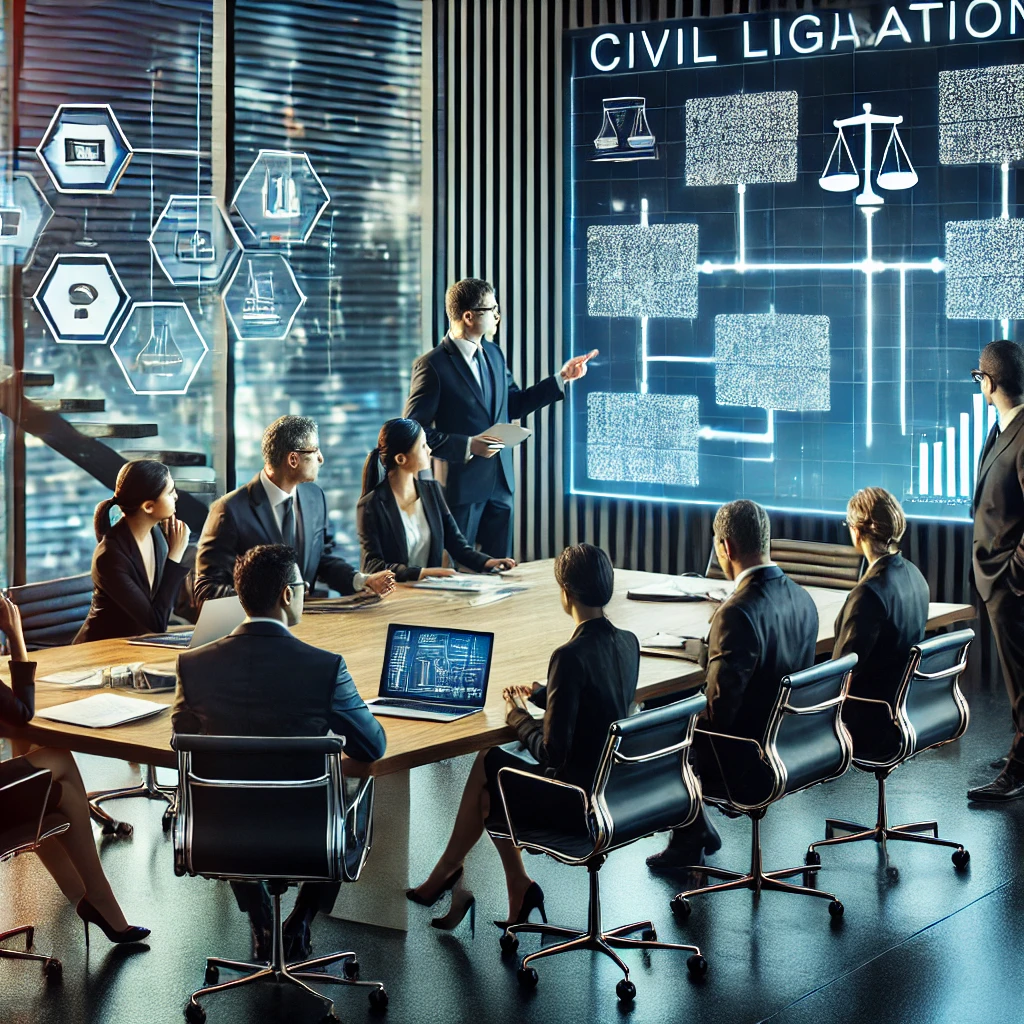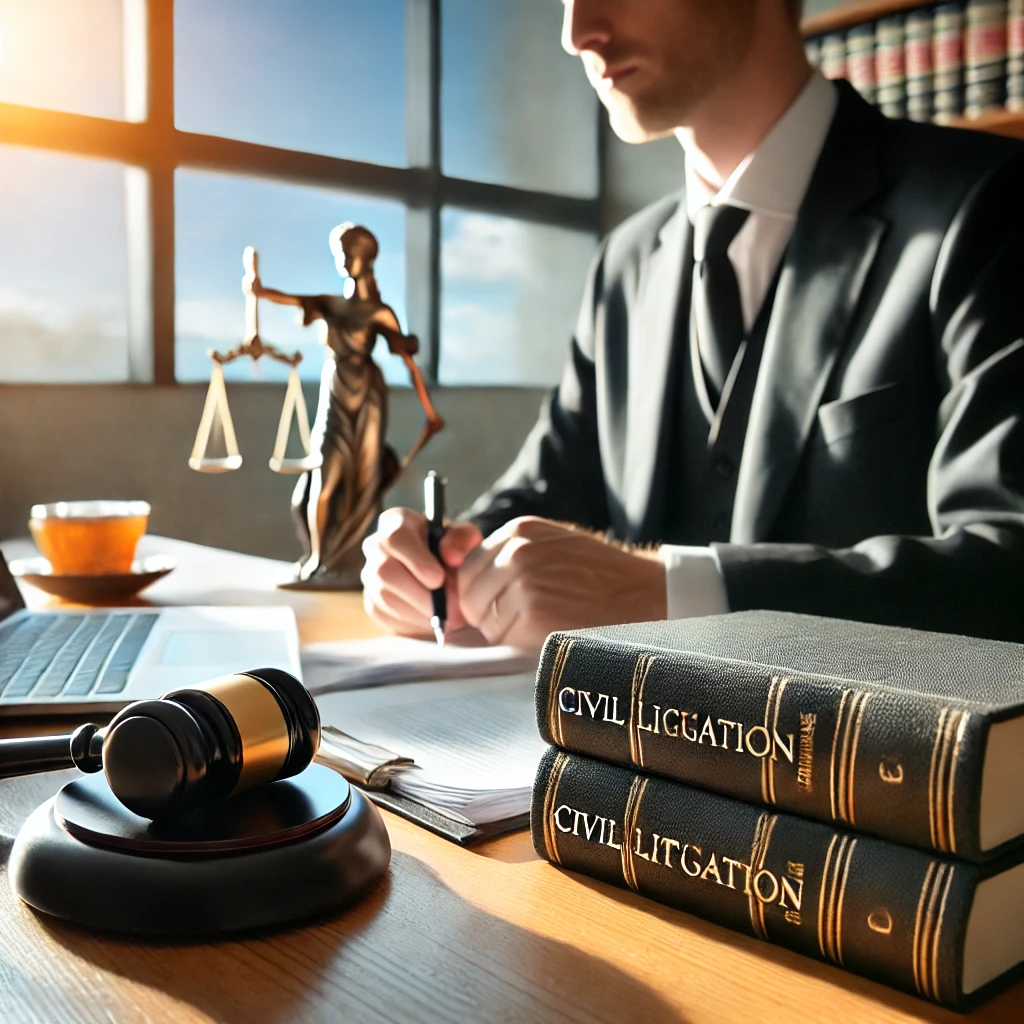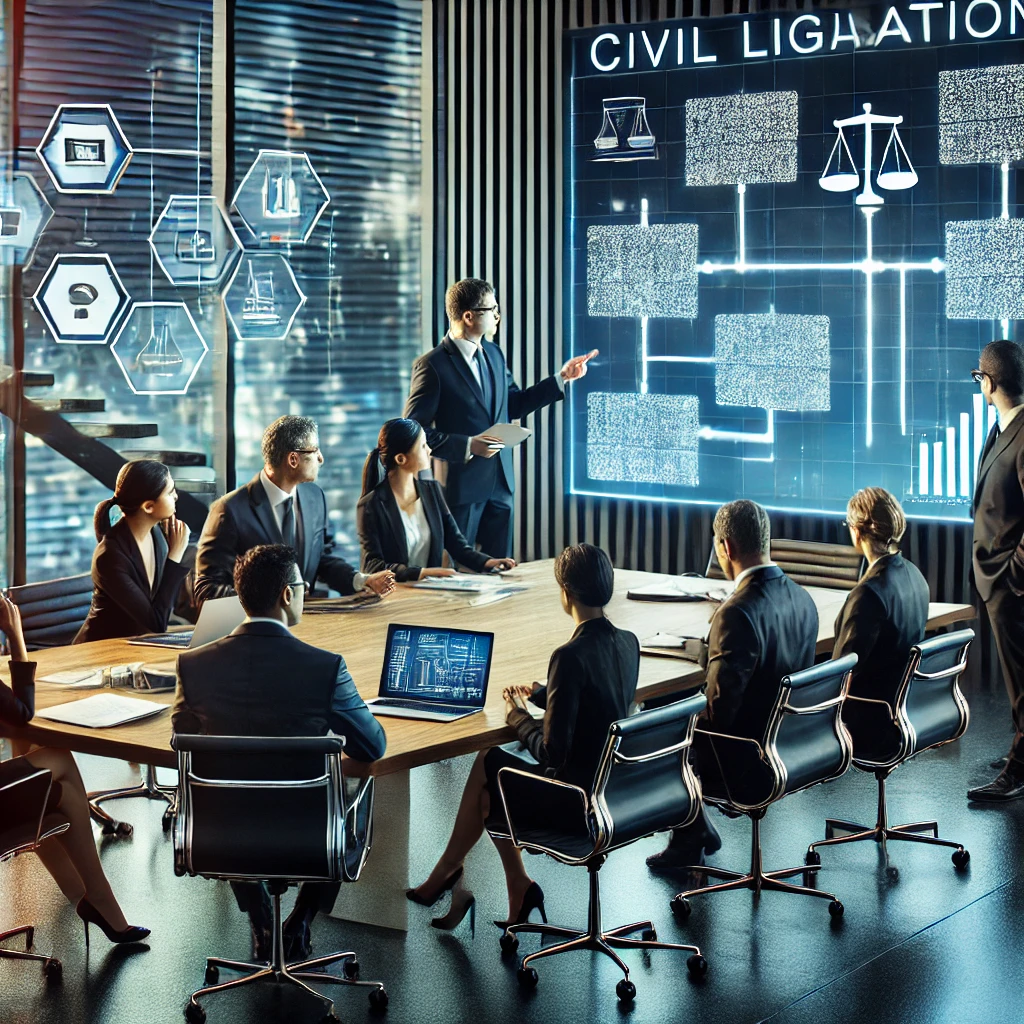
Civil Litigation Attorney: Your Complete Guide to Legal Representation
Table of Contents
- What Is a Civil Litigation Attorney?
- What Does a Civil Litigation Attorney Do?
- Types of Cases Handled by Civil Litigation Attorneys
- Why You Might Need a Civil Litigation Attorney
- How to Choose the Right Civil Litigation Attorney
- The Civil Litigation Process: Step-by-Step
- Benefits of Hiring a Civil Litigation Attorney
- Key Traits of a Successful Civil Litigation Attorney
- What to Expect During Your First Meeting
- Frequently Asked Questions About Civil Litigation Attorneys
- Final Thoughts
What Is a Civil Litigation Attorney?
A civil litigation attorney is a legal professional who specializes in representing clients involved in non-criminal disputes. These disputes often arise between individuals, businesses, or organizations. Civil litigation attorneys handle cases that range from breach of contract to property disputes and personal injury claims.
In essence, their role is to advocate for clients in civil court proceedings or negotiate settlements to resolve legal issues.
What Does a Civil Litigation Attorney Do?
Civil litigation attorneys manage every aspect of a case, ensuring their clients’ rights and interests are protected. Here’s a breakdown of what they do:
- Legal Consultation: Providing an initial assessment of the case.
- Document Preparation: Drafting pleadings, motions, and discovery requests.
- Investigation: Collecting evidence and interviewing witnesses.
- Negotiation: Settling disputes out of court through mediation or arbitration.
- Court Representation: Representing clients in trial proceedings.
- Appeals: Filing or defending appeals post-verdict.
The civil litigation attorney aims to resolve disputes efficiently while achieving the best outcome for their client.

Types of Cases Handled by Civil Litigation Attorneys
Civil litigation attorneys deal with a variety of cases. Here are the most common types:
- Personal Injury Claims
- Car accidents
- Slip-and-fall incidents
- Medical malpractice
- Business and Commercial Disputes
- Breach of contract
- Partnership disputes
- Intellectual property claims
- Employment Litigation
- Wrongful termination
- Discrimination
- Wage disputes
- Real Estate Litigation
- Property disputes
- Landlord-tenant issues
- Zoning conflicts
- Family Law Matters
- Divorce proceedings
- Child custody disputes
- Consumer Protection Cases
- Fraud claims
- Defective products
Whether your issue involves financial damages or personal harm, a civil litigation attorney can guide you through the legal process.
Why You Might Need a Civil Litigation Attorney
You may need a civil litigation attorney when facing a dispute you cannot resolve on your own. Here are some reasons why hiring an attorney is crucial:
- Legal Expertise: Understanding complex laws and procedures.
- Objective Advice: Avoiding emotional decisions that may harm your case.
- Evidence Collection: Gathering and presenting compelling evidence.
- Negotiation Skills: Achieving favorable settlements without going to trial.
- Courtroom Experience: Representing you effectively in court.
Without a professional attorney, you risk losing your case or receiving an unfavorable settlement.

How to Choose the Right Civil Litigation Attorney
Selecting the right civil litigation attorney can significantly impact the outcome of your case. Here are some tips to guide you:
- Evaluate Their Experience
- Choose an attorney with a proven track record in your specific type of case.
- Check Their Reputation
- Look for client reviews and testimonials online.
- Seek referrals from trusted sources.
- Assess Communication Skills
- The attorney should keep you informed and explain complex terms clearly.
- Compare Fees
- Understand their fee structure (hourly, contingency, or flat fee).
- Ask Questions
- What is their strategy for your case?
- How long do they estimate the process will take?
By following these steps, you can ensure you find the right civil litigation attorney for your needs.
The Civil Litigation Process: Step-by-Step
Understanding the civil litigation process will help you know what to expect when working with a civil litigation attorney. Here is a step-by-step breakdown:
1. Initial Consultation
- Discuss your case and potential outcomes with the attorney.
- Review relevant documentation and evidence.
2. Investigation and Pleadings
- The attorney gathers facts and drafts the complaint or response.
- Pleadings are filed with the court to start the litigation process.
3. Discovery Phase
- Both parties exchange information and evidence through depositions, interrogatories, and requests for documents.
4. Pre-Trial Motions
- Attorneys may file motions to resolve issues before trial (e.g., summary judgment).
5. Settlement Negotiations
- Many cases are resolved through negotiation, mediation, or arbitration.
6. Trial
- If no settlement is reached, the case proceeds to court, where both parties present evidence.
7. Post-Trial and Appeals
- Depending on the verdict, the attorney may file appeals or motions to enforce the judgment.
A skilled civil litigation attorney will guide you through each stage, protecting your interests.
Key Traits of a Successful Civil Litigation Attorney
When searching for the right attorney, look for these key traits:
- Strong Analytical Skills
- The ability to dissect complex legal issues and build solid arguments.
- Excellent Communication
- Clear communication with clients, judges, and opposing counsel.
- Negotiation Abilities
- Skill in securing favorable settlements.
- Courtroom Presence
- Confident and persuasive representation in court.
- Attention to Detail
- Ensuring all evidence, documents, and filings are accurate and timely.

What to Expect During Your First Meeting
Your initial consultation with a civil litigation attorney sets the foundation for your case. Here’s what to expect:
- Case Assessment: The attorney will review your case details and explain your legal options.
- Fee Discussion: They will clarify their fees and billing structure.
- Next Steps: You will receive a roadmap of the litigation process and what to prepare next.
- Questions and Concerns: Use this opportunity to ask questions and clarify any doubts.
Being prepared for this meeting ensures a smooth start to your legal journey.
Benefits of Hiring a Civil Litigation Attorney
Here are the key benefits of working with a civil litigation attorney:
- Expert Legal Advice: You receive clear guidance tailored to your case.
- Time and Stress Management: Attorneys handle paperwork, negotiations, and legal proceedings.
- Maximized Compensation: Attorneys strive to achieve the best possible outcome.
- Access to Resources: Experienced attorneys have access to expert witnesses, investigators, and legal tools.
- Stronger Negotiation: Lawyers have the skills to settle disputes effectively.
By hiring a civil litigation attorney, you increase your chances of success in any legal dispute.
Benefits of Hiring a Civil Litigation Attorney
Here are the key benefits of working with a civil litigation attorney:
- Expert Legal Advice: You receive clear guidance tailored to your case.
- Time and Stress Management: Attorneys handle paperwork, negotiations, and legal proceedings.
- Maximized Compensation: Attorneys strive to achieve the best possible outcome.
- Access to Resources: Experienced attorneys have access to expert witnesses, investigators, and legal tools.
- Stronger Negotiation: Lawyers have the skills to settle disputes effectively.
By hiring a civil litigation attorney, you increase your chances of success in any legal dispute.
Frequently Asked Questions About Civil Litigation Attorneys
1. What is the difference between civil and criminal litigation?
- Civil litigation involves disputes between parties seeking compensation or specific performance, while criminal litigation involves the government prosecuting individuals for criminal offenses.
2. How much does a civil litigation attorney cost?
- Fees vary based on the attorney’s experience, the complexity of the case, and the fee structure (e.g., hourly rates, contingency fees).
3. Can a civil litigation attorney settle a case out of court?
- Yes, many cases are resolved through settlement negotiations, avoiding the need for trial.
4. How long does civil litigation take?
- The timeline depends on the case’s complexity, evidence availability, and court schedules. Simple cases may take months, while complex disputes can take years.
5. Do I need a civil litigation attorney for small claims court?
- While not required, an attorney can still provide valuable guidance and improve your chances of success.
Civil Litigation Attorney
A civil litigation attorney plays a vital role in resolving disputes and protecting your rights in civil matters. Whether you are dealing with a personal injury, a business conflict, or a property issue, having an experienced attorney on your side can make all the difference.
By understanding their role, the types of cases they handle, and how to choose the right attorney, you can navigate the legal process with confidence. Don’t wait until it’s too late—consult a qualified civil litigation attorney to ensure the best possible outcome for your case.

For more legal insights, check out our other guides on personal injury law, business litigation, and employment disputes.
If you found this article helpful, share it with others who might benefit from understanding the role of a civil litigation attorney.
Civil litigation attorneys manage every aspect of a case, ensuring their clients’ rights and interests are protected. Here’s a breakdown of what they do:
- Legal Consultation: Providing an initial assessment of the case.
- Document Preparation: Drafting pleadings, motions, and discovery requests.
- Investigation: Collecting evidence and interviewing witnesses.
- Negotiation: Settling disputes out of court through mediation or arbitration.
- Court Representation: Representing clients in trial proceedings.
- Appeals: Filing or defending appeals post-verdict.
The civil litigation attorney aims to resolve disputes efficiently while achieving the best outcome for their client.
Types of Cases Handled by Civil Litigation Attorneys
Civil litigation attorneys deal with a variety of cases. Here are the most common types:
- Personal Injury Claims
- Car accidents
- Slip-and-fall incidents
- Medical malpractice
- Business and Commercial Disputes
- Breach of contract
- Partnership disputes
- Intellectual property claims
- Employment Litigation
- Wrongful termination
- Discrimination
- Wage disputes
- Real Estate Litigation
- Property disputes
- Landlord-tenant issues
- Zoning conflicts
- Family Law Matters
- Divorce proceedings
- Child custody disputes
- Consumer Protection Cases
- Fraud claims
- Defective products
Whether your issue involves financial damages or personal harm, a civil litigation attorney can guide you through the legal process.

Recommended Software and Services for Civil Litigation Attorneys
Modern civil litigation attorneys rely on software and services to manage their cases efficiently and deliver optimal results for clients. Below are some highly recommended tools and platforms:
1. Clio
- Purpose: Case Management
- Features: Document management, billing, time tracking, and client communication.
- Why It’s Useful: Clio simplifies case organization, making it easier for attorneys to manage multiple cases.
2. LexisNexis
- Purpose: Legal Research
- Features: Access to legal databases, case laws, statutes, and analytical tools.
- Why It’s Useful: Attorneys can perform in-depth research to strengthen their arguments and case strategies.
3. Westlaw
- Purpose: Legal Research
- Features: Comprehensive legal research tools, including AI-driven analytics and document retrieval.
- Why It’s Useful: Westlaw provides accurate, up-to-date legal resources for case preparation.
4. MyCase
- Purpose: Practice Management Software
- Features: Case tracking, billing, client portals, and workflow automation.
- Why It’s Useful: Ideal for small to mid-sized firms looking to streamline their operations.
5. Relativity
- Purpose: eDiscovery Software
- Features: Data processing, document review, and advanced search capabilities.
- Why It’s Useful: Relativity makes eDiscovery faster and more accurate, which is essential for civil litigation attorneys handling large datasets.
6. DocuSign
- Purpose: Electronic Signatures
- Features: Secure and legally binding e-signatures for documents.
- Why It’s Useful: Allows attorneys and clients to sign documents remotely, speeding up workflows.
7. TrialPad
- Purpose: Trial Presentation Software
- Features: Organize and present evidence in court with annotations, highlights, and callouts.
- Why It’s Useful: Enhances courtroom presentations, making it easier to convey arguments.
8. Everlaw
- Purpose: Document Review and Case Preparation
- Features: Collaborative document review, case analysis, and reporting tools.
- Why It’s Useful: Supports efficient team collaboration for large, complex litigation cases.
9. Smokeball
- Purpose: Legal Practice Management
- Features: Automated document creation, time tracking, and email integration.
- Why It’s Useful: Helps attorneys save time by automating administrative tasks.
10. LawPay
- Purpose: Payment Processing
- Features: Secure payment options for clients, including credit cards and online payments.
- Why It’s Useful: Streamlines invoicing and ensures timely payments from clients.
These tools not only enhance productivity but also improve client satisfaction and case outcomes. By incorporating these platforms into their practice, civil litigation attorneys can focus on delivering the best possible results.

Final Thoughts
A civil litigation attorney plays a vital role in resolving disputes and protecting your rights in civil matters. Whether you are dealing with a personal injury, a business conflict, or a property issue, having an experienced attorney on your side can make all the difference.
By understanding their role, the types of cases they handle, and how to choose the right attorney, you can navigate the legal process with confidence. Don’t wait until it’s too late—consult a qualified civil litigation attorney to ensure the best possible outcome for your case.
For more legal insights, check out our other guides on personal injury law, business litigation, and employment disputes.
If you found this article helpful, share it with others who might benefit from understanding the role of a civil litigation attorney.






